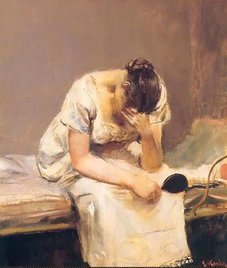|
At Home, Cambridge, Massachusetts
“Christians are greatly criminal for not living in the constant enjoyment of God. He is ever ready and willing to manifest the glories of his character to their souls; and nothing but their native opposition to holiness, and their love of evil, ever perverts. Are not believers inconsistent creatures? They can speak of a Savior’s love, the happiness resulting from an acquaintance with God, and point out the road to impenitent sinners, which alone will lead to substantial bliss; and yet often wander in forbidden paths – lose all relish for spiritual enjoyments, and rest contented with the low pleasures of sense. If I am a child of Jesus, this inconsistency has often been mine. And yet I long for a greater sense of my dependence, and more entire conformity to Him who died for me. If any thing here deserves the name of happiness, it does not spring from earth. No! it is of heavenly birth, and comes from the regions of purity. The vast and boundless desires implanted in the human heart, cannot by satisfied with any thing short of God. Nothing in heaven or earth is capable of affording real bliss, without him.” - Harriet Newell, 1811
0 Comments
 At Home, Arlington, Massachusetts I've been working on my Jonathan Edwards paper for my Harvard class and I came across the following passage on Sarah Edwards. I started crying reading these words because they were just so convicting. And beautiful. Oh, Lord, please move in my heart to have this same concern for my baby. Please, I am so selfish. Please remind me to pray more for this little baby. People say that having a child will teach you to be less selfish, but that doesn't strike me as inevitable. There are many selfish parents out there in the world. Please move in my heart to think more of others than of myself. Amen. “But this was not all, in which she express’d her care for her children. She thought that parents had great and important duty to do towards their children before they were capable of government and instruction. For them she constantly and earnestly pray’d, and bore them on her heart before God, in all her secret and most solemn addresses to him; and that even before they were born. The evidences of her pregnancy, and consideration that it was with a rational, immortal creature, which came into existence in an undone, and infinitely dreadful state, was sufficient to lead her to bow before God daily for his blessing on it; even redemption, and eternal life by Jesus Christ. So that thro’ all the pain, labour and sorrow, which attended her being the mother of children, she was in travail for them, that they might be born of GOD by having Christ formed in them.” - Samuel Hopkins God, part of the problem is my selfishness. But part of the problem is that I just don't pray. Apart from sporadic mornings, I don't set aside time to be quiet before you and pray. How can I have such a heart to pray for my child if I don't have a heart to pray in the first place? Maybe it's not two problems, but really just one – selfishness. Maybe my inability to pray consistently and to spend time with you is just that – selfishness. I don't want to give up my time, my control, my mind. I don't want to work at it. Is that just selfishness? Lord, please, teach me to pray. At Home, Arlington, Massachusetts
"'But, Sister, you will follow me soon. You don't think any mortal life seems a long thing to me tonight? And how would it be better if I had lived? I suppose I should have been given to some king in the end - perhaps another as our father. And there you can see again how little difference there is between dying and being married. To leave your home - to lose you, Maia, and the Fox - to lose one's maidenhead - to bear a child - they are all deaths. Indeed, indeed, Orual, I am not sure that this which I go to is not the best.' 'This!' 'Yes. What had I look for if I lived? Is the world - this palace, this father - so much to lose? We have already had what would have been the best of our time. I must tell you something, Orual, which I never told to anyone, not even you...' 'What is it?' said I, looking down at her lap where our four hands were joined. 'This,' she said, 'I have always - at least, ever since I can remember - had a kind of longing for death.' 'Ah, Psyche,' I said, 'have I made you so little happy as that?' 'No, no, no,' she said. 'You don't understand. Not that kind of longing. It was on happy days when we were up there on the hills, the three of us, with the wind and the sunshine... Where you couldn't see Glome or the palace. Do you remember? The colour and the smell, and looking across at the Grey Mountain in the distance? And because it was so beautiful, it set me longing, always longing. Somewhere else there must be more of it. Everything seemed to be saying, Psyche come! But I couldn't (not yet) come and I didn't know where I was to come to. It almost hurt me. I felt like a bird in a cage when the other birds of its kind are flying home. '...The sweetest thing in all my life has been the longing - to reach the Mountain, to find the place where all the beauty came from... '- my country, the place where I ought to have been born. Do you think it all meant nothing, all the longing? The longing for home? For indeed it now feels not like going, but like going back. All my life the god of the Mountain has been wooing me... I am going to my lover. Do you not see now-?'" ~~~~~~~~~~~~~~~~~~~~~ I am rereading C.S. Lewis's Till We Have Faces and I've just read the above passage. There are probably no words out there that better describe how I have felt about my life for as long as I can remember. It's not morbid and it's not dark, but I've longed for what Psyche describes for so many years, and it has always been when I am happiest. When I am sad or depressed, I become controlling and feel the need to try to make everything right. But when I am happy, I am ready to be away. Ready to be home. It is the beautiful things in life that often feel the most unbearable. They are all shadows. Last night Trey and I had the most perfect sex we've yet experienced. It was everything I could have ever imagined sexual intimacy being. But if I was given the opportunity to leave now and enter into eternity, I would take it. The beauty of last night makes me ready because I know last night can't be repeated. It was good and whole and perfect – it was release from desiring something better. Now that I've tasted it, I feel satisfied and satisfaction is the end of things, not the beginning. In the above passage, Lewis states a truth that he seems afraid to understand, or at least to state in his other writings on the topic. Sehnsucht is in reality a longing for death. It is a desire for what cannot be obtained in this world when we are confronted with what the world has to offer. Lewis is indeed right when he says that our desires are too small. But if we desire aright, how can that desire be contained by this world? To desire what this world cannot offer is to desire that which requires my departure from this world. I am crying as I write this, but I am not sad. I simply am longing. And that longing aches so greatly. God, I know that, I, as a child of the promise, have you now, here. But I do not have the redeemed world yet. I do not have heaven – complete unity with you. I am still tied down by all of these things around me and when they are good, when they are everything I could ever want them to be, they only make the ache worse, because they only refresh the longing for everything else to be as right as they are in that moment. When Lewis says that marriage, and the loss of virginity, and the bearing of children are all a certain kind of death, I wonder how much he knew he was right on the subject. Did he accidentally stumble upon a truth all women known within their souls? Or did he understand the depths of this statement? Death involves the taking away of life, and for a woman much about the experience of creating life comes through ending some part of her own life. She does not become a wife without giving up independence. She does not become sexually active without being invaded. She does not become a mother without physical destruction in her body. But these all offer life, living, being alive as a result. I have now experienced two of these three things, and I hope soon to enter into the final and third. Might I see in these the same longing for death that Lewis describes with sehnsucht? In each of these experiences, am I not entering into a greater good, a better reality through that which is a kind of death? God, have you created woman so that what she longs for now requires in some parts her negation? Is the pattern of this fallen world so much replicated in my lived reality? When I receive the most good, I long the most for heaven. When I receive the most good, I am the most ready to bear children. But ultimately, to attain both requires a death within me. (Image by Surian Soosay, "Alternate Mother Nature, Internatal Internet.") |
About the ProjectThis is a very personal project. It tracks my growth and development as I journeyed toward motherhood over the recent years. It doesn't document every experience I had, and probably neglects my more joyful and peaceful moments in the frenzy of trying to communicate my fears, anxieties, and doubts. If you are a friend or loved one, please do not let anything you read here overshadow what you know of me personally. If you are a stranger, please remember that a living and flawed person stands behind these words. To all my guests here, please understand these are not political statements and try to extend me grace, even as I share my failures and foibles - I have repented of much of what I share. I don't share this journal as an exemplar, but rather out of the desire to share my hope that entrance to motherhood does not need to be a fearful thing - despite the very real fears I have fought against. Motherhood is simply a part of life and one through which I am discovering more of myself and my God. Archives
May 2017
Categories
All
|

